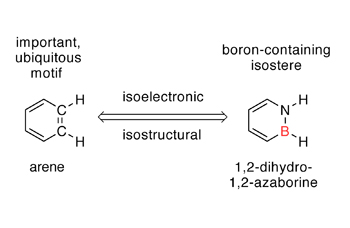Research
We are engaged in synthetic boron chemistry with an emphasis on expanding the chemical space of organic and biological small- and macro-molecules beyond what nature can achieve with boron-containing analogues.

We are particularly interested in the development of boron(B)–nitrogen(N)-containing heterocycles, specifically azaborines. These are structures resulting from the replacement of two carbon atoms in benzene with a boron and a nitrogen atom. Azaborines are isosteres of the important family of benzenoid compounds / arenes. They closely match the size and shape of ordinary benzene rings, and they still enjoy considerable aromatic stabilization, but most of their other physical, chemical, and spectroscopic properties are significantly altered. We aim to exploit the unique properties of azaborines and investigate their potential as arene surrogates in materials and biomedical research. Our approach combines the broad utility of arenes with the unique elemental features of boron. Areas of exploration include organic synthesis, catalysis, hydrogen storage, optoelectronic materials, and drug discovery. The development of azaborines has the potential of changing the way chemists think about creating molecular diversity, namely through isosterism.

We are skilled in a variety of experimental techniques commonly applied in synthetic organic/organometallic chemistry, e.g., air-free Schlenk line and glovebox techniques for the preparation of our compounds, and X-Ray, NMR, MS, IR, UV-vis, HPLC, GC, electrochemistry for their characterization.

